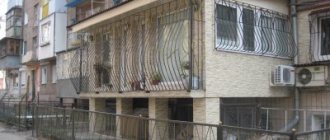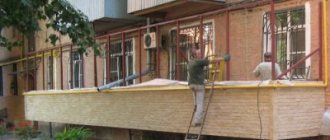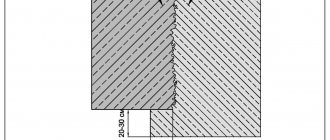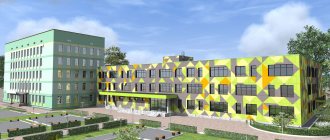Despite the apparent disadvantages of apartments on the ground floors (noise on the street, a high probability of theft, etc.), there is still an advantage of living on the ground floor - the opportunity to expand your living space by constructing an extension - a part of the building located outside the contour of the main external walls
But building an additional room/bedroom/veranda, etc. is not so easy, because first you need to legalize such construction.
How to legalize an extension to an apartment building in 2021, what is the procedure?
How to design an extension to a private or apartment building
If it is impossible to obtain ownership of it now, then you can rent it.
An emergency exit is to create a project for an extension standing on stilts. Neighbors and permitting authorities may refuse their consent to the construction of a building or its official registration in the following cases: There is an opinion that if you are the owner of a site where there is a private house, then you can add anything to it without permission from any authorities, but this not this way. If you want to add something to your private home, then remember the following: Permission is not required only for the construction of non-permanent extensions to the house, for example: The following documents will be required: To file a claim, the documents required are the same as in the previous case, but additionally will be required statement of claim. If the court's decision is
When can they refuse to approve an extension?
Attention! Here are the following reasons that may become grounds for refusing to legalize an extension:
- non-compliance of the structure with the preliminary design,
- non-compliance with technical regulations: for example, being too close to communication lines,
- use of materials that do not have certification,
- the use of irrelevant construction methods considered obsolete,
- balcony or loggia windows facing the city/village center,
- violation of the aesthetic integrity of the MKD,
- recognition of the house as a cultural heritage monument,
- lack of permission from other owners.
Separately, it is prohibited to erect a balcony close to the wall of the house, as this is fraught with possible destruction of the supporting structure of the apartment building.
Watch the video. Unauthorized extensions to balconies:
Permission for an extension to an apartment building
Rationale: In the case under consideration, the owner, in the absence of permits for the construction of an extension to an apartment building, needs to coordinate the redevelopment carried out in connection with the following.
Thus, in this case, in the absence of a permit, there is an unauthorized redevelopment of the residential premises. In accordance with paragraph 3 of Art. 29 of the Housing Code of the Russian Federation, the owner of a residential premises that was unauthorizedly redeveloped is obliged to bring such residential premises to their previous condition within a reasonable time and in the manner established by the body carrying out the approval. According to paragraph 4 of Art. 29 of the Housing Code of the Russian Federation, based on a court decision, residential premises can be preserved in a redesigned state, if this does not violate the rights and legitimate interests of citizens or does not create a threat to their life or health.
In the case under consideration, the owner of the premises in an apartment building constructed an extension to the house, occupying part of the plot that was part of the common property. Judicial practice shows that placing objects on a land plot that is part of the common property of the owners of the premises of an apartment building without the consent of the owners is illegal.
Regarding the placement of an extension to an apartment building on a plot of land owned by a municipality, the following must be clarified. In accordance with paragraph 1 of Art. 28 of the Land Code of the Russian Federation, land plots from lands in state or municipal ownership are provided to citizens and legal entities for ownership or lease. Thus, in order to place an extension on a land plot owned by a municipality, the owner of the premises must enter into an appropriate agreement with the local government body.
In the case under consideration, the apartment building is managed by a management organization.
Vladimir Panin, General Director of the State Budgetary Institution MosgorBTI, answers:
On the territory of Moscow, issues of approving the redevelopment (reconstruction) of premises in apartment buildings fall under the competence of the Moscow Housing Inspectorate. Taking into account the information contained in the appeal about the availability of permits for the construction of an extension and its operation with technical and economic indicators for the apartment, the area of the apartment will be determined as the sum of the areas of all living rooms and utility rooms without taking into account loggias, balconies, verandas, terraces and cold storage rooms, vestibules . The BTI explication will contain complete information about all the premises of the apartment, their numbering, area and purpose of the rooms. To take into account the changes made, the owner of the premises or his authorized representative (with a notarized power of attorney) must contact the technical inventory organization with an application and provide the following documents: a passport of a citizen of the Russian Federation (if necessary, a power of attorney), title documents for the apartment, permitting documentation for the changes made.
The basis for taking into account in the documentation of the State Budgetary Institution MosgoBTI changes in the technical characteristics of the premises is the Act of the Moscow Housing Inspectorate on the reconstruction and (or) redevelopment of the premises in an apartment building and a residential building and design documentation. Services provided by inventory organizations are provided on a reimbursable basis.
How to coordinate redevelopment
Self-coordination of redevelopment: easier than it seems
Adjacent territory of an apartment building
The adjacent territory is transferred to the owners of apartments in a high-rise building free of charge, although it is considered a taxable object. The amount of tax for each resident depends on the number of apartments in the building, between which it is distributed proportionally.
All listed objects must be located within the boundaries indicated in the cadastral passport. Owners can entrust the management of their plot to:
- house committee (independent management),
- HOA or other special non-profit organization;
- management company.
Is it worth registering the local area as property? Arguments in favor: While the roads and surrounding area are in municipal ownership, they are somehow patched up from the city budget.
By the way, pothole repair 1 sq. m of asphalt costs 700 rubles, and capital - 1000 rubles. Officials review the application and form a land plot with cadastral registration.
After this procedure, the territory becomes the property of the residents of the house (free of charge).
The list of services for landscaping and sanitary maintenance of the site includes: Privatizing the adjacent territory of an apartment building is not always easy, but in the end, residents will be sure that only they will dispose of the land near their home.
How to legalize an extension?
An extension is a part of a building, the construction of which requires obtaining the same permits as for the construction of the main house. If it is necessary to use an additional plot of land for a new extension, the technical characteristics and infrastructure of housing construction will be changed, and people are planned to live on the new area, then it is classified as capital.
The legalization of a capital extension can be carried out both before and after construction work.
At the stage of preparation for reconstruction, it is required to have the following documents on hand to legalize an extension to a private house: Coordination of the reconstruction with the SES, fire service, architectural department and other services may also be required. To obtain consent for the construction of a capital extension, the prepared package of documents must be submitted to the local government authority. As a rule, to do this, you should contact an architectural bureau or department of the municipality.
The procedure for registering a major extension to an apartment building has some differences from the method described above for legitimizing the reconstruction of private housing construction:
- for an apartment building, written permission from all residents is required;
- it is necessary to have reports from utility services about the presence of communications located near the house;
- more serious requirements are placed on the construction project.
The most common reasons for refusal of approval for an extension are: Refusal of local government authorities to consent to the construction of an extension can be appealed in court.
If for any reason the documents for a major extension were not drawn up before the start of construction, then the only way to legalize it after construction will be an appropriate court decision.
This is important to know: Is it possible to privatize an apartment in a dilapidated building?
The owner has no choice but to register the squatter settlement in court, acting as a plaintiff. The same package of documents is attached to the statement of claim as for the legalization of an extension, sometimes it is supplemented with photographs of the object or land plot. As a result, if the court makes a positive decision to recognize the extension as legal, it will be possible, on the basis of this decision, to register it with Rosreestr.
You should know that the documentation package and procedure for legitimizing capital and non-permanent extensions are different. The cost of services is determined and agreed upon with the client in each specific case.
Application procedure
Registration of a building structure considered as an adjoining building is the prerogative of specially authorized bodies. The application procedure is determined by the classification of the extension.
On the way to legitimizing the extension, the first service to which contact is mandatory should be local administrative authorities.
In most cases, administrative services have an architectural department, whose specialists have the rights and authority to coordinate construction work.
The Architectural Department is the first and most desirable authority to which applicants should submit applications regarding both an extension being prepared for construction and one currently at the completion stage.
The final decision is made by a specially selected commission, whose members arrive at the site at the location of the house with an extension.
They draw up an act confirming the compliance of the constructed structure with basic building codes.
But this procedure is possible only after the successful completion of a check to compare the final structure with the draft project, which, in turn, is carried out after confirming the availability of a special permit to carry out restoration work.
The owner of the house has the right to change technical documents and register private ownership of the housing complex in accordance with the conclusions of the act.
Attention! Our qualified lawyers will assist you free of charge and around the clock on any issues. Find out more here.
Submitting an application after the successful completion of the construction process is still a valid reason to submit a formal application to the local administrative authorities.
Since the developer does not have a license to carry out construction work, the administration refuses to legalize the extension.
After this, the owner has the right to apply to the court to obtain the right to officially legitimize the constructed construction. The outcome of the case will depend solely on the court's decision.
Watch the video. How to legalize the construction of a balcony on the first floor:
How to obtain permission for an extension to an apartment building?
Contents of the article: You can build a balcony only after receiving official permission from the municipality. To do this, you need to prepare a package of documents and a project. You will have to collect a package of documents if the object is just planned for construction.
But this will have to be done even if you have already built the constructed building. All extensions can be divided into two main types: If you are planning to build a capital building, you need to prepare the following package of documents:
- Permission from all residents of the house.
- Project of the premises.
- Certificate of ownership or extract from the Unified State Register.
- General plan of the premises.
- Official permits from the Committee of Architecture, Rospotrebnadzor and the Fire Service.
After completion of the work, it is necessary to draw up an acceptance certificate, which must contain the signatures of members of the acceptance committee.
The selection committee includes the following persons:
- Owner of the apartment.
- Employee of a design organization.
- Utility representative.
- Local administration employee.
After signing the act, do not forget to order a BTI technical passport and submit information about the changes to Rosreestr.
If you have attached a balcony or veranda to your apartment, they must be recognized as non-residential premises.
Sometimes citizens add entire living quarters. But these actions are considered illegal.
In this case, the construction will not be legalized.
After preparing the documents and drawing up the project, you must contact the local government.
Use the following tips: Thus, you have the opportunity to add a balcony or veranda to your apartment. It is important that all documents are completed correctly and in a timely manner. The video story will tell you how to legalize the extension of a balcony
Answered by lawyer, K. Yu. n. Yulia Verbitskaya:
Unfortunately, if the documentation attached to the purchase and sale agreement (floor plan, design plan, explication) does not provide for a balcony in your apartment, you do not have the right to demand that the developer “add a balcony.”
As usual, there are two ways out. Firstly, if the house is new, there is a reasonable possibility of changing your apartment (without a balcony, loggia) to another apartment, but on a higher floor (with a loggia and balcony). Perhaps, when concluding an exchange agreement, you will have to make an additional payment both for additional meters (balcony, loggia) and for a higher floor. It should be noted that if not all apartments in the building are sold, it will be easier for you to carry out this “exchange with an additional payment” from the developer himself or from a real estate company involved in the sale of apartments in the building you are interested in.
The second path is more complicated, long and thorny. And, perhaps, quite comparable in price to the first. You can conduct a survey, prepare a project for the construction of an extension in the form of a balcony (loggia) and apply for its approval. Here, the first and necessary condition is to obtain the written consent of the neighbors or a general meeting of the residents of your house. The second stage is the preparation of a balcony project that complies with the building codes and regulations applied at the time of construction of the house, as well as current legal requirements. You will have to coordinate this project with a number of authorities, including BTI, Rospotrebnadzor, state fire supervision authorities, the management company (if there is one), as well as utility services. You can prepare a project and obtain permits for it yourself, or using the services of the MFC.
If the project is approved, you can proceed to the third stage - obtaining permission to carry out construction work.
It should be noted that the process of preparing and collecting documents is quite labor-intensive and, in addition, there are several cases when the likelihood of obtaining permission is extremely low, namely:
- placement of the proposed balcony on the front side of the building;
- the use of structures during the construction of a building that do not allow their integrity to be violated;
- the presence of nearby communications or overhead networks near the site of the proposed work (location of gas pipes on the front of the house), etc.
The main principle that it makes sense for you to follow is to initially agree on the documentation and only then, in strict accordance with the approved design documentation, carry out construction work. Otherwise, there is a high risk that the “attached” balcony will be recognized as an object of unauthorized redevelopment or unauthorized construction, and you will be required to dismantle it within a specified period of time and at your personal expense.
Can it be converted into residential basements and basements?
How to convert residential premises on the 1st floor into non-residential ones?
Legalize an extension to an apartment building
As a general rule, any construction without the necessary permits and on land not allocated for these purposes is considered AWOL. It can consist of several floors and be of any size.
To build such a structure, you must obtain permission from a representative of the municipal authority. garages; canopies that are used for protection from the sun (such an extension does not have to be formalized); porch (not a full extension); residential premises that require registration in accordance with the law; kitchen; balcony; terrace; bathhouse, etc.
If the building is already built in, in order to formalize it, you will need to collect the following documents: An example of how to prepare documents is not difficult to find on the Internet. What should be done to make the extension legal?
The procedure for registering an extension to your own house is specified in the law on state registration.
This can be either the entire house or a separate extension to it. All in all this is called a “created object”.
- Documents for land. This could be renting or selling a plot along with a house. Acts and certificates issued by authorized bodies before the publication of the Land Code of the Russian Federation, i.e. until 2001. If land rights have already been registered according to the specified papers, then their submission to Rosreestr is not required again. It is possible to legalize a private house regardless of the year it was built - the main thing is that there is proper land;
- Documents confirming the creation of an object and containing its description. If the object has already been completed, a permit for entry is required; if the extension is not completed (incomplete), a building permit is required. These permits are issued by the municipality.
In the case of apartments, it is advisable to prepare documents in advance, i.e.
before the start of construction, since not everything can be obtained later.
Advice from experts and lawyers The process of legitimizing an unauthorized extension to a house is quite complex. To draw it up, you should contact a professional lawyer, otherwise you may only lose your time and some money.
After this, the statement of claim is submitted to the judicial authority along with all the collected documents. Moreover, in order for the case to proceed, according to the current legislation, it is necessary to pay the state duty indicated for any application with property claims.
On the legalization of extensions to apartment buildings
Extensions erected without the above permission, according to Article 222 of the Civil Code of the Russian Federation, are recognized as unauthorized buildings and are subject to demolition. Thus, it is not possible to recognize the ownership of an unauthorized reconstructed object in an administrative manner by virtue of the law. In the opinion of the Department, it is considered possible to explain to applicants that the court, when considering a claim for recognition of ownership of an unauthorized reconstructed object, has the right to request the following documents from the plaintiff.
1. Document of title for the land plot on which the extension is built. 3. The decision of the general meeting of owners of premises in an apartment building, adopted in the manner prescribed by the housing legislation of the Russian Federation, i.e.
consent for the construction of an extension, signed by all (100%) owners.
Extension of a balcony on the ground floor: how to legalize an extension to an apartment building
If you want to find out how to solve your specific problem, please contact the online consultant form on the right.
The latter must approve the construction plan and give permission for it. In the case of an already erected structure, it is necessary: If permission is not given for some reason, you must apply to the court with a request to legalize the construction.
Legal consultant Olesya Obizhaeva answers:
All extensions are divided into heated and cold. If the extension is heated, then the total area of the premises is taken into account as part of the housing stock. Since the extension in your case is residential, the total area increases. Consequently, the property under ownership will differ in size, area and layout. When making such changes, it is imperative to document the erected structure. Since in your case the extension has already been erected, but a building permit has not been obtained, such a construction is illegal and should be formalized through the court. To do this, you need to submit a statement of claim to the court along with a package of documents (title documents, extract from the house register, technical documentation of the BTI, reconstruction project, photo, consent of neighbors to erect a building, etc.).
Is it possible to legally convert an attic into a loft?
Can it be converted into residential basements and basements?
How to legalize an unauthorized extension to an apartment or a residential apartment building - legal advice
Here are some tips from legal experts to help you quickly understand the legalization and construction of structures:
- A balcony or loggia should be legalized as non-residential real estate. If you do not do this, you will have to pay a monthly fine of 1 to 2.5 thousand rubles.
- Go to court only when you cannot get permission from the administration. First obtain all the necessary documents from government organizations, be sure that your project is done perfectly. With other authorities, the court case can drag on for a long time.
- The extension should be located 2.5 meters from utilities. A plan for underground communications can be issued by the Committee for Architecture and Urban Planning of your city, or specialists will independently inspect the desired area.
- If your building is adjacent to a plot of land, consider the possibility of privatizing this land. According to the Housing Code, the entire territory next to an apartment building is the property of all apartment residents. In addition, land may be state property.
- It is better that the extension be registered as a separate property. Find out if the structure can be separated from the main structure, and then collect the necessary documents. In addition, find out whether the land plot can be registered as an independent property. Even if you are unable to register it for yourself, you can rent it.
Cost of legalization
The cost of this procedure is determined by its classification. In the case of legalization of an unauthorized extension, ignoring qualified legal assistance can be much more expensive than using it.
The usual price in this case is 1000 rubles, but this amount may vary depending on the region and the degree of professionalism of the lawyer.
A one-time appearance of a specialist in court can cost 5-6 thousand rubles. As the number of meetings increases, the price of an expert’s services will increase exponentially.
Representation of a legal team can vary from 25,000 to 30,000 rubles. in terms of cost.
The management company does not recalculate utility bills.










